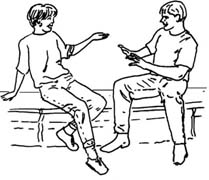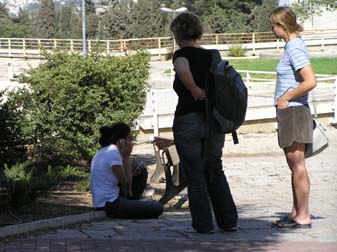1.33

and =
and the = וְהthe =
ה
in
a, at a , with a = בְ in the, at the, with the = בַto
a = לְ to the = לַThese prefixes are always attached to the Hebrew word. They can never stand alone. The prefix
ב when it is the first letter attached to a word is pronounced בּ /b/.REMEMBER: In Hebrew the words
andand
theconsist of single letters that are always attached as prefixes to the word that follows.
If you had a sentence that in English contains the wordsand the,
there
would then be two (2)
prefixes attached to the word
and the morning..
You must always write:
דוד וְרינהNever write דוד ו רינה (with a space after the vav)

Write העיפּרון NOT ה עיפּרון
Don't put in a space after the ה
Find and circle the prefixes in the phrases below:
100.00 %
| דוִד וְגילה |
רינה וְדפְנה |
||
| התלְמיד וְהתלְמידה |
העיפּרון וְהמחְבֶּרֶת |
||
| אני כּותֵב בְּעיפּרון |
אני סטוּדֶנט בּאוּניבֶרסיטה |
||
The prefix
בּ has numerous meanings. Some of the frequent English equivalents are: "in a", "with a" "in the", "at", "at the", or "with the"
 Examples:
At the station בַתחנה
Examples:
At the station בַתחנה
At two o'clock
בְשתייםwith a pencil
בְעיפּרון
Circle the letter(s) in these words that are prefixes. (Watch for "and the")
איפה הבּיִת של יוסף?
בוקר טוב בְּישראל.
הנה הסטודנט והסטודנטית
המפּה הגדולה
43
הבנת הנִשְמע - Learning to Listen to Hebrew : 1.34
![]() Use with Software Chapter 1: "Drill On
Vowels"
Use with Software Chapter 1: "Drill On
Vowels"
For many people, knowing another language means being
able to speak it —
to express their feelings and needs. Since
there is an obvious physical activity involved in speaking, people tend
to think of speaking as an "active" skill and to consider the act
of listening to someone else as a "passive" activity. But
listening is not passive.
Listening is a highly active process that takes considerable concentration and effort. The ability to understand a spoken foreign language is a complex skill that is acquired in stages and through a great deal of practice. Just as you should not expect to be an instant golfer or tennis player, you can expect to achieve total comprehension of spoken Hebrew only after going through a number of stages. Yet at each stage on your way to becoming a "pro", you will experience satisfaction and enjoyment, even as you recognize that you still have more to learn. And, like many skills, there are some "tricks" and techniques that can improve your comprehension of spoken Hebrew. Here are a few examples:
Strategies for Listening
Relax. Don't feel that you have to understand every single word in a sentence in order to figure out what's being said. Usually you will be able to piece together quite a bit of information by using the words you recognize, and by intelligent guessing.
Intelligent guessing is most effective when it is based on a general idea of what the subject is about. Knowing the context and using it to develop a hunch about the meaning of unfamiliar parts of the conversation is a good way to get clues about the meaning.
Watch the speaker's mouth. It will help you to hear more.
Watch the facial expressions and gestures. They contain clues to the mood and purpose of the message. They can signal a question, or an emphatic declaration of affirmation or denial.
Apply the Logic of Circumstantial Evidence... Use Hunches
What's being said? You overhear a telephone conversation. Although you can't understand all of it, you do catch a few words: For example:
window..... vegetarian..... ‘Avis’ is fine.
לתֵל-אביב
.... מחר (("tomorrow"NOTE: Although there may have been more than one hundred words in the telephone conversation, just a few words enable you to capture the gist of the transaction!
44
מי, ואֵיפֹה - Where and Who? - 1.34.1
Practicing minimal responses to classroom conversations
![]() Use with Software Chapter 1:8 "Prepositions Indicating Location" and
Use with Software Chapter 1:8 "Prepositions Indicating Location" and
Chapter 1:11 "Drill on Prepositions (Indicating Location)"
Even without a large vocabulary you will find that you are able to respond in simple ways to spoken Hebrew.
אֵיפֹהYour teacher will move about the classroom, pointing to persons or objects while asking where they are.
Together with the rest of the class you can respond to a question like
אֵיפה דלְיה by pointing to דלְיה.
מי
Assuming that one of the students has chosen that name,
נחום should respond: אניor the entire class can point to him and declare :
זֶה נחוּםIf the question is:
?מי זאת רוּתRuth should reply:
אני רוּתor the entire class can point to her and declare:
זֹאת רוּת.

Below are some additional examples of phrases to be used in class. Some of the questions or directives require one word responses; others require a physical response, such as pointing. Don't try to analyze the grammar of the sentences. Just concentrate on getting the general idea. After your teacher has spent time working with you on these sentences, practice reading the Hebrew sentences on your own.
100.00 %
| אֵיפֹה דוִד |
Where is David |
||
| מי יושֵב על-יד רינה |
Who is sitting next to Rina |
||
| מי יושֶבֶת אחרי שרה? |
Who is sitting (f) behind Sarah? |
||
| אֵיפה השוּרה שֶל ארְיֵה? |
Where is Aryeh's row? |
||
| מי שם? |
Who's there? |
||
| מי יושֵב לִפְנֵי דפְנה? |
Who is sitting in front of Dafna? |
||
45
יֵש, למי יש - There is, There are, Who has
134.2In Hebrew the word
יֵש express the equivalents of the English expressions, there is, there are. I t is used to indicate "existence" in the present tense.
For example:
t is used to indicate "existence" in the present tense.
For example:
There is a big book -
יֵש ספר גדול .יֵש is also used to indicate "possession" when used with a
ל.Rina has a book.-
יֵש לרינה ספרOr, in a question:
Who has a book?
?למי יֵש ספר
![]()
אין - There is no .., There are no ..
134.3
 (existence) There is no book.
(existence) There is no book.
Who doesn't have a book? ?
לְמי אֵין סֵפֶרWho doesn't have a dog? למי אֵין כֶּלֶב?
Learn to use these phrases. Don't worry about grammatical analysis yet. 1.34.4
![]() Use with Software Chapter
1:6 "The Colors in Hebrew"
Use with Software Chapter
1:6 "The Colors in Hebrew"
100.00 %
Who has black hair?
Who is taller, Shlomo or Haim? Who is shorter, Rina or Shoshana? Where is the large book? Who has a red shirt? (The feminine and plural forms of the names of colors will
be given in ¶4.15 .) * In sentence #2 pay special attention to the
pronunciation of the final
46
1.34.5
?מה לכתוב
- Choose a Caption
100.00 %
Write a caption for each cartoon pictures using these
phrases. Use your imagination.
בוקֶר טוב בְבקשה לִקְרוא לְהִסְתכֵּל שְֹמֹאלה אֵיפֹה? בְבקשה בְבקשה לִכְתוב אֵיפֹה הסֵפֶר? יותֵר לְאט בְבקשה לחזור אחריי Using the sentences in
47
לְמי יֵש שֵׂיער שחור?
מי יותֵר גבוהַּ*, שְלֹמֹה או חיים?
מי יותֵר נְמוּכה, רינה או שושנה?
אֵיפֹה הסֵפֶר הגדול?
לְמי יֵש חוּלְצה אדוּמה?
![]()
![]() Use with Software Chapter 2:2
"Responding to Classroom situations"
Use with Software Chapter 2:2
"Responding to Classroom situations"




הֶעָרָה
FYI לידיעתך
There should be no space between the ו and the next letter!